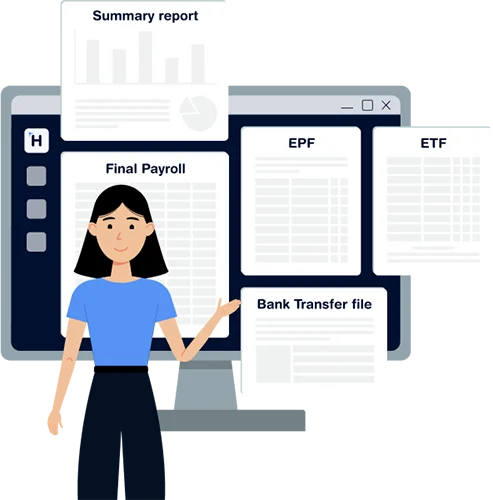Accounting firms offer a wide range of secondary services, such as payroll, accounting, auditing, business incorporation and registration, corporate secretarial, and tax preparation. Among those services payroll is a primary revenue-generating activity and firms encounter several difficulties in handling such services. However, these firms can get over these challenges and change the way they operate by embracing automation.
We will look at five major challenges that accounting firms can overcome by automating secondary services like payroll in this article. By doing so, firms can allocate talented human resources more effectively, save time and energy on repetitive tasks, take on more assignments for secondary services, and turn secondary services into revenue-generating machines rather than labor-intensive burdens.
1. Allocating Talented Human Resources:
By automating secondary services like payroll, accounting firms can free up their skilled professionals from repetitive and time-consuming tasks. Automation streamlines the payroll process, reducing the need for manual data entry and calculations. Automation in payroll management helps to avoid errors that may arise when manually calculating employee salaries, deductions, and other financial aspects.
This allows talented resources like accountants, auditors, and financial analysts to be redirected to more money-making areas of the business, such as financial analysis, strategic planning, or client advisory services. It maximizes the value of human capital and improves overall productivity within the firm.
2. Saving time and energy:
Manual payroll processes are not only repetitive but also prone to errors, which consume valuable time and energy. However, by automating secondary services like payroll, accounting firms can eliminate the need for manual calculations, data entry, and reconciliation. With automated systems in place, the entire payroll workflow can be streamlined, starting from employee profile management and extending to generating pay slips, tax files, and other related reports. The time and energy saved through automation can then be redirected toward more valuable tasks that contribute to the firm’s growth. This allows professionals to focus on higher-value activities and enhance the overall efficiency and productivity of the firm.
Payroll automation helps your accounting firm to save time as it,
- Reduces manual data entry
- Generates pay slips and other related reports
- Eliminates time-consuming manual calculations
- Automates tax compliance process
- Enables efficient record-keeping and reporting
3. Taking on more assignments:
With manual payroll processes, accounting firms may face limitations in the number of clients they can effectively serve. Since manual payroll services require considerable time and effort for each client, it’s difficult to handle a large number of clients and assignments at once. Automating secondary services like payroll enhances operational efficiency, allowing firms to handle a larger volume of assignments. By leveraging automated systems, firms can scale their services without compromising accuracy or client satisfaction. This enables them to expand their clients and seize growth opportunities.
This would result in,
- Increased revenue
- Increased business growth
- Increased reputation of the firm
4. Transforming secondary services into revenue generators:
Traditionally, secondary services like payroll have been viewed as labor-intensive and cost-driven activities. However, automation changes this by turning these services into revenue-generating machines. By getting rid of manual inefficiencies and cutting down on unnecessary expenses, accounting firms can maximize their profitability from secondary services. In simpler terms, automation helps accounting firms make more money by offering better payroll services that clients want to pay for.
Automation allows these firms to provide efficient and streamlined payroll solutions, which not only attract more clients but also create new sources of revenue as this enables them to focus on other secondary services and core services. By saving time and simplifying the process through automation, accounting firms can allocate their resources more effectively, allowing them to take on additional assignments and focus on revenue-generating activities such as financial analysis, strategic planning, or providing value-added services to clients. This means automation allows businesses to save time and work more efficiently, which opens opportunities to generate revenue beyond just payroll services.
5. Strengthening data protection and building client confidence:
Payroll involves handling highly confidential information. As it handles sensitive information and data, ensuring data security and privacy is crucial. Clients entrust their financial details to accounting firms, and any breach of confidentiality can lead to a loss of trust, reputation damage, and potential legal consequences. To address this challenge, accounting firms need to prioritize strict data protection protocols and regular staff training on confidentiality and privacy.
Here are the troubles that can arise from mistakes or mishandling of payroll-related data:
– Financial discrepancies: Mistakes in payroll calculations can result in underpaid or overpaid salaries, causing financial hardships for employees.
– Delayed salary payments: Errors in payroll processing may lead to delayed salary payments, causing frustration and financial inconvenience for employees.
– Tax penalties: Incorrect tax withholdings or filing errors can result in penalties from tax authorities, leading to financial losses for both employees and the accounting firm.
– Strained employee-employer relationships: Payroll mistakes can strain relationships between employees and employers due to financial dissatisfaction or perceived negligence.
– Time-consuming corrections: Rectifying payroll errors requires additional time and effort, diverting resources from other important tasks and creating administrative burdens for the accounting firm.
However, despite automation, regular monitoring and checks of the payroll process are crucial. This ensures smooth operation and accuracy. By reviewing the automated system, you can verify its correct functioning and accurate results and build trust in the reliability of your payroll operations.
Conclusion:
In conclusion, automating secondary services like payroll in accounting firms offers a transformative solution to overcome challenges and optimize operations. By embracing automation, firms can allocate talented resources effectively, save time and energy, increase revenue, and strengthen data protection and client confidence. This comprehensive approach ensures a streamlined workflow, improved productivity, and enhanced profitability. We hope this article has provided you with a clear understanding of how automation can revolutionize accounting firms and pave the way for growth and success.

